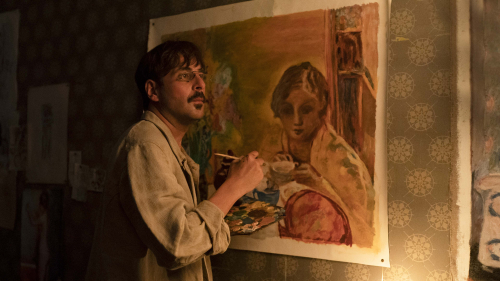
Festival de Cannes
MOVIE REVIEW
Bonnard Pierre and Marthe (2023)
Pierre Bonnard was a leading post-impressionist painter, an artistic revolutionary who never quite achieved international fame and prominence, though he is well-known in France. Director Martin Provost, who also wrote the script with regular collaborator Marc Abdelnour, has significant previous experience in shining a light on the personal lives of underappreciated French artists. The Cannes Film Festival is the natural home for this work, a solid piece of entertainment which demonstrates that life may imitate art, but art imitates the human heart.
They meet in passing on the street, when Pierre (Vincent Macaigne) stopped a young passer-by to ask her to pose for him. He tacks his canvases to the wall and paints with his back to his subject, an unusual technique. She (Cécile de France) is works in an artificial flower factory and is deeply flattered by her first contact with the art world. The drawings come quickly, Pierre is inspired; and it takes them about a day to fall into bed. But while Marthe is bowled over by her new boyfriend she feels tremendously out of place in Pierre’s bohemian milieu. She’s just the slut who gets her arse out for the pictures, she says, no matter how Pierre’s patron Misia (Anouk Grinberg) or their other friends, including Édouard Villiard (Grégoire Leprince-Ringuet), try to convince her otherwise. For Pierre’s part he is in love; and all the mere details of financial survival and the grind of daily living will work themselves out.
They work themselves out because of Misia’s deep pockets and Marthe’s hard work, of course. But the squalor of life in a Parisian garret is soon resolved by the discovery of a large house in the Parisian suburbs. It’s full of light for Pierre’s work, remote enough to give Marthe the privacy she craves (as well as easy skinny-dipping in the Seine; Ms. de France or her body doubles cannonball nude into the river three times over the course of the film), but close enough to civilization for their friends including Claude Monet (André Marcon) to row up for regular picnics. Those friends eventually include a young art student named Renée (Stacy Martin) and suddenly the vibe changes. Marthe tolerates Misia, only getting upset with her for discarding her own artistic ambitions to support those of others, but Renée’s sudden popularity is an unpleasant reminder Pierre is only a man. Mr. Macaigne does a wonderful job here of showing a man used to delegating his emotions for someone else (women) to manage, and woefully incapable of taking responsibility for his own choices. But the complicated events that follow unlock something in Marthe. For decades she kept her own counsel and some pretty big secrets, but this unpleasant shock suddenly enables her to paint her own works at last.
The scene where Pierre comes home to his studio covered in Marthe’s pictures is what every artist wants from a boyfriend: He examines the pictures and reassures her they’re good. She offers to cook dinner but he says he’ll do it (for the first time in their relationship) because she is the artist and she is working. He’s changed, for the better, at last. You can see what they’ve always known about each other in that little moment, but of course it might be too late.
Artistic biographies are valuable for showing how a life and a work are inescapably intertwined, except everyone dies and the work lives. The point Mr. Provost is making with this film is that what matters to the artists is love; and the work left behind is only important if it demonstrates love (for a woman, for an almond tree, for your dogs). This idea more than makes up for the film itself breaking no new ground. But a fine story expertly told is always a real treat and that, like love, must never be taken for granted.
Comments